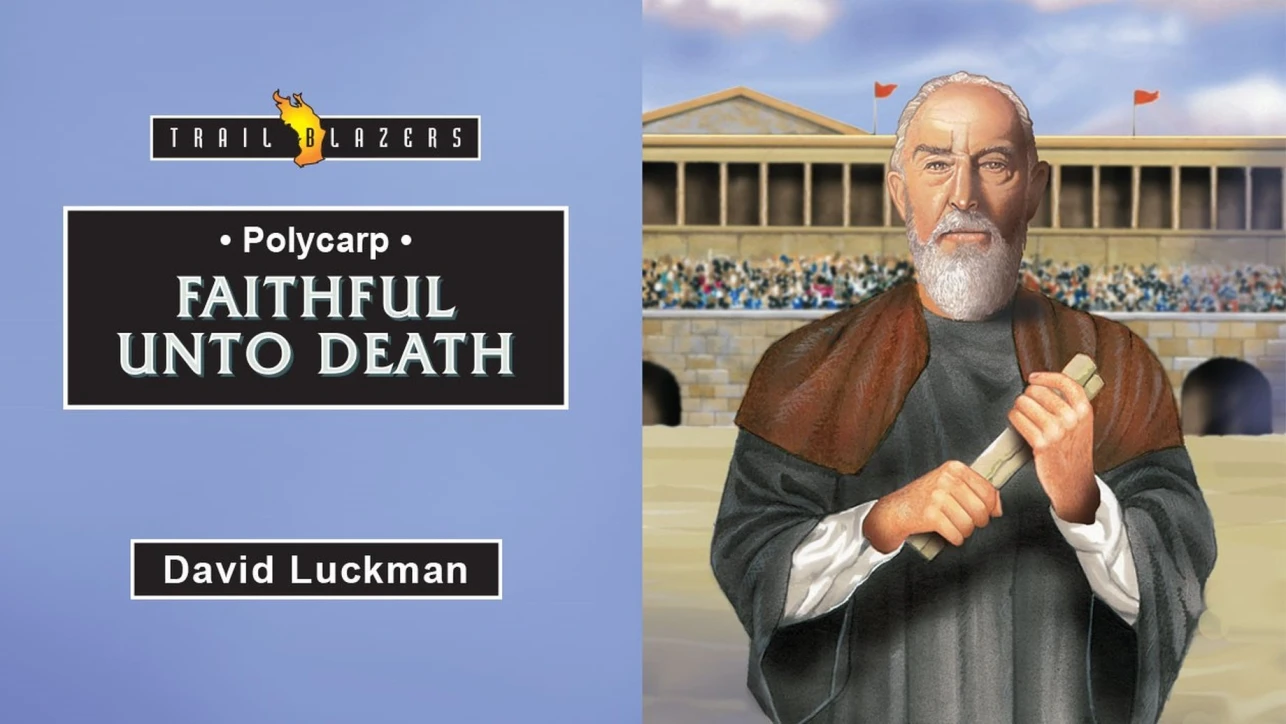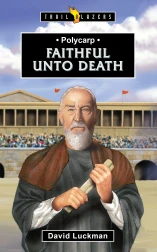Polycarp – Faithful unto Death
‘And to the angel of the church in Smyrna write: “The words of the first and the last who died and came to life. I know your tribulation and your poverty… do not fear what you are about to suffer…be faithful unto death and I will give you the crown of life… the one who conquers will not be hurt by the second death”’ (Revelation 2:8–11, ESV).

‘And to the angel of the church in Smyrna write: “The words of the first and the last who died and came to life. I know your tribulation and your poverty… do not fear what you are about to suffer…be faithful unto death and I will give you the crown of life… the one who conquers will not be hurt by the second death”’ (Revelation 2:8–11, ESV).
The city of Smyrna was regarded as the pride of Asia Minor. It was one of the most prosperous cities in that province of the Roman Empire. In 195 BC a temple was constructed to “Dea Roma”. This was Rome personified as a goddess. Smyrna was known for its patriotism to Rome.
In Ad 25, there were a lot of Asian cities competing for the privilege of building a temple to the Emperor Tiberius. So the cult of “Empire” and “Emperor worship” was a matter of great pride in Smyrna.
The church in Smyrna was a suffering church because it was an uncompromising church.
The church in Smyrna was a suffering church because it was an uncompromising church. The church endured sufferings for Jesus Christ. The Christians would not burn incense to Caesar, and they would not call him “Lord” because only Jesus Christ is Lord. So the Christians were viewed by society as obstinate, lacking patriotism and worthy of persecution.
This came as no surprise to the Smyrnaean church because Jesus had warned his disciples that persecution and suffering would be the world’s response to people who live their lives following him (Matthew 5:10–12).
The Christians in Smyrna were resolved to do business honestly and missed out on some easy profits which went to their less scrupulous competitors. It is likely that the Jews and pagans in Smyrnaean society would not do business with a Christian either.
The Jews wagged their tongues circulating false rumours and poisoning minds against the Christian church in Smyrna. It is true that slander is never easy to bear. The enemies of Jesus were speaking against his church in Smyrna. And although poverty and slander were only a couple of the tribulations that the Christians experienced at Smyrna, there was more to come. Imprisonment was on its way, which is not an uncommon experience for those who follow Jesus Christ.
How should the church respond? Jesus says, ‘Be faithful unto death…’ (Revelation 2:10).
Opposition to the gospel was so fierce that martyrdom was a real possibility. In the New Testament, it is an indispensable mark of every true Christian and church – the inevitability of the world’s persecution is stressed over and over again. Jesus says, ‘If the world hates you, know that it has hated me before it hated you,’ (John 15:18).
From the time of Nero onwards Christians were classed along with atheists and sorcerers as sacrilegious people and enemies of the human race. They were in danger, not only from local policing on the part of the Roman authorities, but also from mob violence. Inclined to stir up trouble whenever an opportunity occurred, the population in its ignorance and credulity, hated what it did not understand. Wild stories circulated about the Christians, things like, they were atheists who would destroy the world with fire, or they practised incestuous rites. From time to time, alarmed by some natural calamity such as an earthquake, or angry at a slump in trade, the mob would clamour for retribution on the Christians.
To the Roman authorities the church was a potentially dangerous secret society. Perhaps understandable, since in each city Christians formed an organised body under the leadership of a bishop. The city would include within its jurisdiction a large tract of country surrounding it and the church in that city would do the same. Each bishop had some presbyters under him whom he could assign to take his place, and these men would conduct the worship of groups of Christians in outlying places.
More alarming to the authorities than its local strength was the church’s unity. The churches in different cities were in constant touch by envoy and letter. To be a Christian was to be a member of the body of Christ, not merely of the particular community at Smyrna, or Ephesus or wherever.
The life and death of Polycarp perfectly illustrate the conditions under which Christians lived in the first half of the second century, for his long quiet working life ended in sudden, unexpected martyrdom.
Born around 70AD, Polycarp grew up in Smyrna. He became a student of the apostle John – the one who received the revelation of Jesus Christ while he was in exile on the Greek island of Patmos in around AD 96. Polycarp grew strong in the Lord and his word. He was eventually made the Bishop of Smyrna and served a faithful and obedient ministry in that city.
As an octogenarian, he was hunted down, arrested, and sentenced to death in front of a stadium full of people baying for his blood. The governor promised to release him. All he had to do was deny Christ and burn incense to Caesar, with the words, “Caesar is Lord”.
Polycarp replied, ‘Eighty and six years have I served [Christ], and he has done me no wrong; how then can I blaspheme my King who saved me?’
Polycarp replied, ‘Eighty and six years have I served [Christ], and he has done me no wrong; how then can I blaspheme my King who saved me?’
For this courageous stand, Polycarp was sentenced to be burned alive. As he stood bound to the pyre, the wind drove the flames away from him, prolonging his agony, until a soldier’s blade put an end to him in February 156AD.
Polycarp was faithful to the Lord Jesus to the end.
One of the important truths that the book of Revelation wants us to understand is that we live in a time of war in the spiritual world. In this battle between God and the enemy, Satan, the front line is the local church – that is where the attacks of Satan are focussed. Church leaders are also in the cross hairs. Satan knows that he is powerless against God, so like a terrorist, he target’s God’s family.
Smyrna was a suffering church. With the call to suffer, however, came a promise of accompanying grace.
Christ’s call to suffer is timeless in its application. God’s church today cannot expect better treatment in the world than our Lord Jesus had. Indeed, many of God’s people may lose their lives and have done, just like the martyr Polycarp did. However, the crown of life awaits. Heaven is the winning post at the end of a race and eternal life is the victor’s crown.
Suffering and persecution doesn’t silence or stop the growth of the church. Rather the opposite is true. As Augustine poignantly said, “The martyrs were bound, imprisoned, scourged, racked, burnt, rent, butchered – and they multiplied”.

